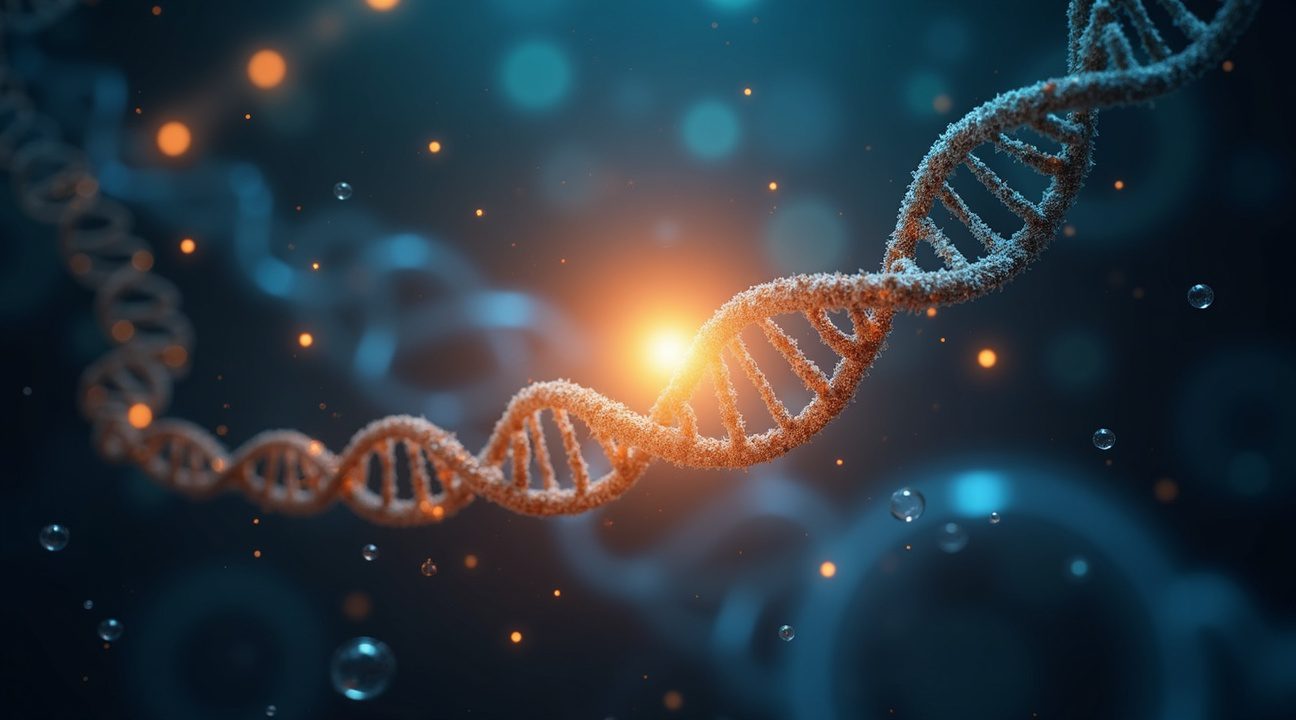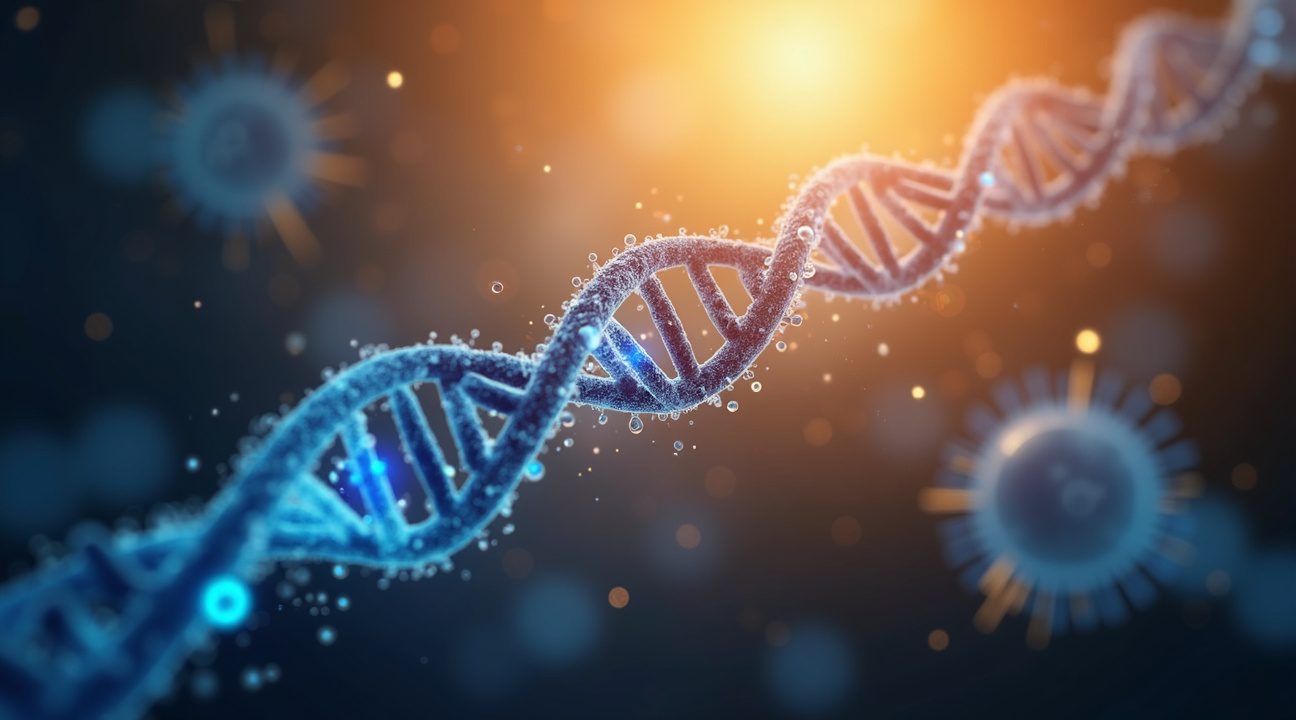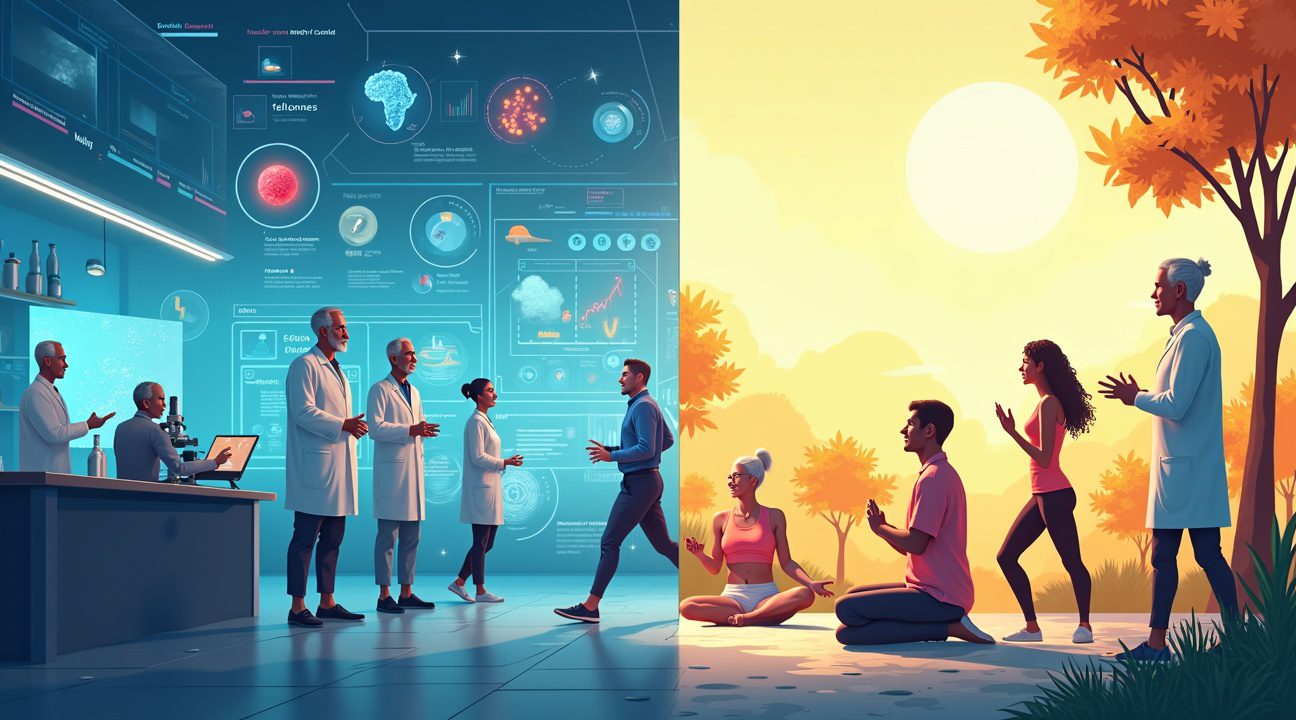The VITAL study has delivered compelling evidence that vitamin D supplementation can significantly slow biological aging at the cellular level. Participants taking 2,000 IU daily maintained telomeres that were 140 base pairs longer than the placebo group over four years. This groundbreaking research represents the first large-scale, long-term demonstration that a simple, affordable supplement can preserve telomere length and effectively reduce cellular aging by approximately three years.
Key Takeaways
- Vitamin D supplementation preserves telomeres: Daily intake of 2,000 IU of vitamin D3 maintained telomeres that were 140 base pairs longer than placebo groups, translating to roughly three years less biological aging over four years.
- Combined interventions amplify anti-aging effects: The DO-HEALTH trial showed that combining vitamin D with omega-3 fatty acids and exercise created synergistic effects that slowed biological aging by 2.9 to 3.8 months over three years.
- Targeted supplementation shows greatest benefits: High-risk groups including individuals with chronic inflammatory conditions, elevated C-reactive protein levels, or limited sun exposure may benefit most from vitamin D’s protective effects.
- Safety and individualized approach are essential: Blood testing should determine vitamin D status before supplementation, as the 2,000 IU dosage used in research is safe for most adults but individual needs vary significantly.
- Multiple protective mechanisms at work: Vitamin D combats cellular aging through anti-inflammatory properties, enhanced immune regulation, improved DNA repair processes, and reduced chronic inflammation that accelerates telomere degradation.
Vitamin D Supplementation Preserves Telomeres, Adding Years to Your Cellular Lifespan
I’ve analyzed a groundbreaking discovery that challenges everything we thought we knew about aging. The VITAL study, a landmark randomized controlled trial, has delivered compelling evidence that vitamin D supplementation can literally slow down the aging process at a cellular level.
Scientists tracked approximately 1,000 participants aged 50 and above over four years, measuring their telomere length through white blood cell samples at baseline, two years, and four years. The results were remarkable. Participants who took 2,000 IU of vitamin D3 daily maintained telomeres that were, on average, 140 base pairs longer than those in the placebo group.
The Cellular Clock That Vitamin D Can Reset
Telomeres function as protective caps on chromosomes, much like the plastic tips on shoelaces. Each time cells divide, these telomeres shorten slightly. When they become critically short, cells can no longer divide properly, leading to cellular aging and death. This process drives many age-related health issues, from cardiovascular disease to cognitive decline.
The VITAL study participants began with an average telomere length of 8,700 base pairs. Over the four-year period, those taking vitamin D supplements showed significantly reduced telomere loss compared to the control group. This 140 base pair difference translates to approximately three years less biological aging — a profound finding that suggests cellular protection mechanisms can be enhanced through targeted supplementation.
I find it fascinating that such a simple intervention produced measurable anti-aging effects. The study’s design was particularly strong because it followed participants for an extended period and used multiple measurement points, ensuring the results weren’t due to chance or temporary fluctuations.
Research indicates that telomere shortening accelerates with age, stress, poor diet, and environmental toxins. However, the VITAL study demonstrates that vitamin D supplementation can counteract some of this damage. The 2,000 IU daily dose used in the study is well within safe limits for most adults and represents a practical intervention that millions could potentially benefit from.
Implications for Preventive Medicine and Longevity
The implications extend beyond individual health. If vitamin D can genuinely slow biological aging by preserving telomeres, this could revolutionize how we approach preventive medicine and healthy aging strategies. The supplement industry has long claimed anti-aging benefits for various products, but few have the rigorous scientific backing that this study provides for vitamin D.
What makes this discovery particularly exciting is vitamin D’s safety profile and accessibility. Unlike experimental anti-aging treatments that cost thousands of dollars, vitamin D3 supplements are affordable and widely available. The dose used in the study — 2,000 IU daily — is considered safe for most adults and can be easily incorporated into daily routines.
The study’s findings also suggest that vitamin D’s benefits extend far beyond bone health, which has been its primary recognized function. By preserving telomere length, vitamin D appears to support fundamental cellular processes that affect overall longevity and health span.
Foundation for Future Research
I believe this research will spark increased interest in precision nutrition approaches to aging. Rather than accepting cellular deterioration as inevitable, we can now point to specific interventions that measurably slow the aging process. The VITAL study provides a foundation for future research exploring:
- Optimal dosing strategies
- Timing of supplementation
- Combinations with other nutrients
These could potentially enhance the anti-aging effects observed in the current study.
The beauty of this discovery lies in its simplicity. While scientists continue developing complex anti-aging therapies, this study shows that a basic vitamin supplement can provide meaningful protection against cellular aging. For individuals serious about longevity and healthy aging, maintaining adequate vitamin D levels appears to be one of the most evidence-based strategies available today.

How Vitamin D Protects Your DNA From Age-Related Damage
Telomeres serve as protective DNA caps positioned at chromosome ends, functioning much like the plastic tips on shoelaces that prevent fraying or tangling. These essential structures maintain genetic stability by safeguarding chromosomes during cell division processes. I’ve observed how these microscopic guardians work tirelessly to preserve cellular integrity throughout our lives.
Each time cells divide, telomeres naturally shorten, creating a biological clock that tracks aging at the cellular level. This progressive shortening directly correlates with increased aging and heightened disease susceptibility. Research demonstrates that shortened telomeres significantly elevate risks for multiple serious conditions, including bladder, lung, kidney, and gastrointestinal tract cancers, alongside type 2 diabetes and vascular dementia.
Vitamin D’s Protective Mechanisms
Vitamin D emerges as a powerful ally in protecting against telomere shortening through several key mechanisms:
- Anti-inflammatory properties that reduce cellular stress and oxidative damage
- Enhanced immune system regulation that prevents autoimmune disorders
- Protection against advanced cancer development
- Improved cellular repair processes that maintain DNA integrity
- Reduced chronic inflammation that accelerates telomere degradation
The VITAL trial provides compelling evidence supporting vitamin D’s protective effects against age-related cellular damage. This landmark research reveals how adequate vitamin D levels can significantly impact our biological aging process. I find it particularly fascinating that this simple nutrient influences such fundamental cellular mechanisms.
Understanding these protective effects helps explain why vitamin D deficiency correlates with accelerated aging and increased disease risks. The vitamin’s anti-inflammatory properties directly combat the cellular stress that contributes to telomere shortening. Additionally, vitamin D’s role in immune system regulation helps prevent the chronic inflammation that damages DNA over time.
Maintaining optimal vitamin D levels becomes increasingly important as we age, given the natural decline in telomere length. The nutrient’s ability to support cellular repair processes means it actively fights against the biological aging process at the most fundamental level. Recent findings suggest that individuals with higher vitamin D levels maintain longer telomeres compared to those with deficiencies.
This groundbreaking research transforms our understanding of how nutrition impacts aging at the cellular level. While sleep quality and other lifestyle factors matter, vitamin D stands out for its direct impact on DNA protection. The implications extend far beyond bone health, touching every aspect of healthy aging and disease prevention.

Combined Vitamin D, Omega-3, and Exercise Create Powerful Anti-Aging Effects
The DO-HEALTH trial has revealed that combining vitamin D with omega-3 fatty acids and exercise creates a synergistic effect that significantly slows biological aging. This groundbreaking research demonstrates how integrative approaches can deliver far superior results compared to single interventions.
The Triple-Action Anti-Aging Protocol
Participants in the DO-HEALTH trial followed a specific regimen that included these key components:
- Daily supplementation with 2,000 IU of vitamin D
- 1 gram of omega-3 fatty acids per day
- Adherence to a structured home exercise program
- Consistent implementation over a three-year period
The study’s findings show that while omega-3 fatty acids alone provided positive anti-aging benefits, the combination of all three interventions produced cumulative effects that were far more impressive. Researchers measured these improvements using advanced DNA methylation biomarkers, including PhenoAge, GrimAge2, and DunedinPACE, which serve as accurate indicators of biological aging.
I find it particularly compelling that participants who followed the complete protocol experienced a slowing of their biological aging process by 2.9 to 3.8 months over the three-year study period. This means their bodies aged nearly three months less than expected during that timeframe, effectively buying them precious time in their fight against cellular deterioration.
The power of sleep and recovery also plays a crucial role in this anti-aging equation, as proper rest enhances the body’s ability to utilize these supplements effectively. Exercise, when combined with vitamin D and omega-3s, creates an environment where cellular repair mechanisms function optimally.
What makes this research particularly significant is its emphasis on additive benefits rather than isolated interventions. The study clearly demonstrates that no single supplement can match the powerful effects achieved through strategic combination therapy. Vitamin D enhances calcium absorption and immune function, omega-3 fatty acids reduce inflammation and support cardiovascular health, while exercise stimulates cellular regeneration and maintains muscle mass.
The DO-HEALTH trial’s methodology using DNA methylation clocks represents a major advancement in aging research. These biomarkers provide objective measurements of how quickly someone’s cells are aging, offering concrete evidence that this three-pronged approach genuinely slows the biological aging process. Rather than relying on subjective assessments or basic health markers, researchers can now track aging at the cellular level with unprecedented accuracy.
What These Findings Mean for Your Health Strategy
I believe this groundbreaking research marks a significant milestone in aging science, as it represents the first large-scale, long-term study to demonstrate that vitamin D supplementation can protect telomere length. The clinical impact extends beyond simple supplementation recommendations, offering new insights into how we might approach cellular aging prevention.
Understanding Study Limitations and Future Research Needs
While these results show promise, I recognize that further studies are needed to assess the broader impact on public health. The research provides a strong foundation, but scientists require additional data to fully understand how vitamin D’s protective effects translate into real-world health outcomes across diverse populations.
Results suggest that vitamin D may help preserve biological youth at the cellular level, yet researchers advise against indiscriminate supplement use. This cautious approach reflects the scientific community’s commitment to evidence-based recommendations rather than rushing to conclusions based on preliminary findings. The study’s scope, while impressive, represents just one piece of a larger puzzle that researchers continue to assemble.
Targeted Supplementation for High-Risk Groups
Instead of universal supplementation, emphasis should remain on a balanced diet and healthy lifestyle as primary health strategies. However, I see particular value in targeted supplementation for specific populations who might benefit most from vitamin D’s protective effects.
High-risk groups that may warrant special consideration include:
- Individuals with chronic inflammatory conditions like rheumatoid arthritis or inflammatory bowel disease
- People with elevated C-reactive protein levels indicating systemic inflammation
- Those at increased risk of chronic diseases driven by inflammation, such as cardiovascular disease or diabetes
- Adults with limited sun exposure or dietary vitamin D intake
- Older adults who naturally experience accelerated telomere shortening
Targeted supplementation might have particular benefits for people with high inflammation or elevated risk of chronic diseases driven by inflammation. This personalized approach aligns with modern precision medicine principles, where treatments are tailored to individual risk profiles rather than applied universally.
I recommend consulting with healthcare providers to assess individual vitamin D status through blood testing before beginning any supplementation regimen. This approach ensures that interventions address actual deficiencies rather than assumptions about need. Healthcare professionals can evaluate inflammatory markers, existing health conditions, and lifestyle factors to determine whether vitamin D supplementation fits into a comprehensive health strategy.
The research also highlights the importance of viewing vitamin D supplementation as part of a broader anti-aging approach rather than a standalone solution. Quality sleep, regular exercise, stress management, and proper nutrition all contribute to telomere health and cellular aging prevention.
Moving forward, I anticipate that researchers will investigate optimal dosing strategies, duration of supplementation, and combination therapies that might enhance vitamin D’s protective effects. These future studies will likely examine how vitamin D interacts with other nutrients and lifestyle factors to maximize telomere preservation.
The findings suggest that maintaining adequate vitamin D levels throughout life may serve as a preventive strategy against accelerated aging, particularly for those with inflammatory conditions. This represents a shift from treating aging as inevitable to viewing it as a modifiable biological process that responds to targeted interventions.
For now, the most prudent approach involves working with healthcare providers to assess individual risk factors, vitamin D status, and overall health goals. This collaborative strategy ensures that any supplementation decisions are based on scientific evidence and personal health needs rather than general population recommendations.
Should You Start Taking Vitamin D for Anti-Aging Benefits
The research on telomere preservation used a specific dosage of 2,000 IU of vitamin D3 daily, providing a clear starting point for those considering supplementation. I recommend checking your current blood levels of vitamin D before beginning any supplement regimen, as excessive intake can lead to harmful effects including kidney damage and calcium buildup in tissues.
Who Benefits Most from Vitamin D Supplementation
Certain populations show the greatest potential for anti-aging benefits from vitamin D supplementation. These groups include:
- Individuals with diagnosed vitamin D deficiency
- Older adults whose skin produces less vitamin D naturally
- People at heightened risk for inflammatory or chronic diseases
- Those with limited sun exposure due to lifestyle or geographic location
Natural food sources offer an excellent foundation for maintaining adequate vitamin D levels. Fatty fish like salmon provide substantial amounts of this crucial nutrient, while fortified dairy products offer another reliable option. Regular sunlight exposure remains one of the most effective ways to boost vitamin D production naturally.
The key lies in taking an individualized approach to your health decisions. I suggest consulting with a healthcare provider to determine your current vitamin D status and whether supplementation makes sense for your specific situation. Blood testing reveals whether you fall into the deficiency category that could benefit most from the anti-aging effects observed in recent studies.
Safety considerations shouldn’t be overlooked when exploring vitamin D3 supplementation. While the 2,000 IU dosage used in telomere research appears safe for most adults, individual needs vary significantly. Some people require higher doses to achieve optimal blood levels, while others may reach adequate levels with lower amounts.
Maintaining a healthy diet and active lifestyle remains essential for long-term wellness, regardless of supplementation choices. Vitamin D works synergistically with other nutrients and lifestyle factors to support cellular health and potentially slow biological aging processes. Quality sleep and regular exercise complement vitamin D’s effects on inflammation and cellular repair.
The anti-aging benefits observed in research don’t replace fundamental health practices but rather enhance them. Consider vitamin D supplementation as one component of a comprehensive approach to healthy aging, not a standalone solution for turning back the clock on biological processes.
Key Study Limitations and Future Research Directions
While the vitamin D research presents compelling evidence for biological aging benefits, I must acknowledge several important limitations that require consideration. The study’s scope, though groundbreaking, leaves room for expanded investigation that could strengthen our understanding of vitamin D’s role in cellular health.
Current Research Limitations
The most significant limitation involves the measurement methodology used in the study. Researchers assessed telomere length exclusively from white blood cells rather than examining multiple tissue types throughout the body. This approach provides valuable insights but doesn’t capture the complete picture of vitamin D’s effects on cellular aging across different organs and systems.
Additionally, the clinical significance of maintaining longer telomeres needs more comprehensive examination. The study showed the clearest anti-aging benefits primarily in high-risk subgroups, which suggests that vitamin D supplementation may work differently depending on individual health status and risk factors. This finding raises important questions about who benefits most from supplementation and under what circumstances.
I want to emphasize that vitamin D supplementation shouldn’t replace fundamental health practices. The research doesn’t suggest that taking vitamin D supplements can compensate for poor nutrition habits or sedentary lifestyles. Proper sleep, regular exercise, and balanced nutrition remain cornerstones of healthy aging, regardless of supplementation strategies.
Promising Directions for Future Research
- Multi-tissue analysis: Future studies should expand beyond white blood cell analysis to examine telomere length across various tissue types. This broader approach would help researchers understand whether vitamin D affects aging consistently throughout the body or if certain tissues respond more favorably than others.
- Demographic and population-specific investigations: Different demographic groups may require distinct supplementation strategies based on factors such as age, geographic location, baseline vitamin D levels, and genetic variations in vitamin D metabolism. Studies focusing on these variables could lead to more personalized recommendations.
- Dosing and timing: Researchers also need to explore optimal dosing protocols and timing for vitamin D supplementation. Current guidelines primarily focus on bone health and basic physiological functions, but anti-aging benefits may require different approaches. Long-term studies tracking participants over decades would provide valuable data about sustained effects and potential risks.
- Nutrient interaction: The interaction between vitamin D and other nutrients deserves attention as well. Some research suggests that vitamin D works synergistically with other compounds, and understanding these relationships could enhance supplementation effectiveness. Advanced analytical methods may help identify optimal nutrient combinations for maximizing anti-aging benefits.
- Understanding biological mechanisms: Mechanistic studies could also clarify exactly how vitamin D influences telomere maintenance. While the current research demonstrates correlation, understanding the specific biological pathways involved would strengthen the case for targeted interventions and help identify additional therapeutic targets.
- Healthy population studies: Clinical trials examining vitamin D supplementation in healthy populations would complement the existing research that focused primarily on high-risk groups. These studies could determine whether vitamin D benefits extend to individuals without obvious deficiencies or health concerns.
- Alternative delivery methods: Research into delivery methods represents another frontier worth exploring. Different forms of vitamin D supplements, timing of administration, and combination with other interventions might optimize absorption and effectiveness for anti-aging purposes.
- Cost-effectiveness: Cost-effectiveness analyses would help determine the practical implications of widespread vitamin D supplementation for biological aging. Understanding the economic impact alongside health benefits could inform public health policies and individual decision-making about supplementation strategies.
The vitamin D aging research opens exciting possibilities while highlighting the need for continued investigation. These limitations don’t diminish the study’s significance but rather point toward opportunities for deeper understanding and more refined applications in promoting healthy aging.

Sources:
Healthline – Vitamin D May Slow Biological Aging Process
Fortune – Vitamin D Supplements Slow Biological Clock, Aging Telomeres
Powers Health – Vitamin D Might Fend Off Biological Aging
Harvard Gazette – Vitamin D Supplements May Slow Biological Aging
National Heart, Lung, and Blood Institute (NHLBI) – Vitamin D Supplements May Slow Cellular Aging
Mass General Brigham – Vitamin D Supplements Show Signs of Protection Against Biological Aging
Nature – (Study published in Nature journal)


